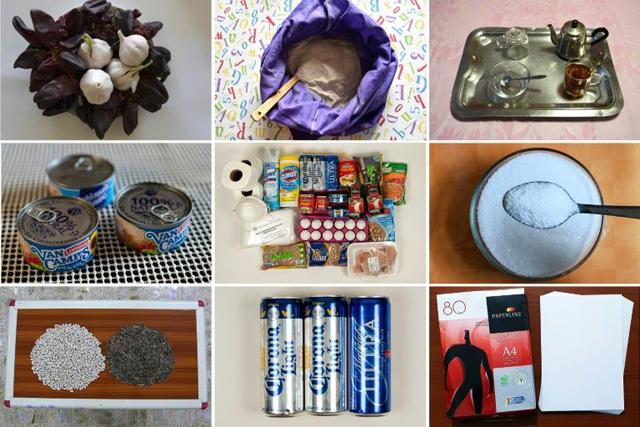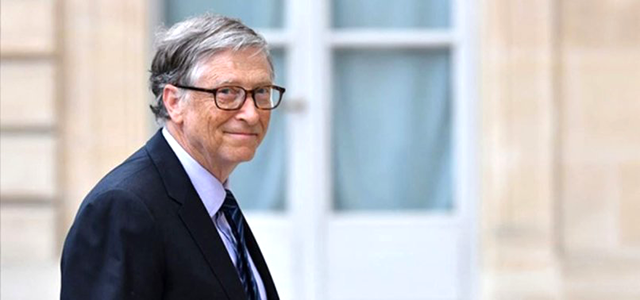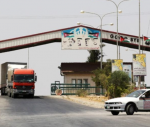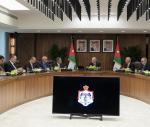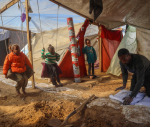You are here
Middle East mythbusters battle virus ‘infodemic’
By AFP - Jul 22,2020 - Last updated at Jul 22,2020

Items in high demand in various countries because of coronavirus – from left to righ — garlic in Tunisia, semolina in Algeria, black tea, (middle left to right) tuna, groceries, sugar, (bottom left to right) sunflower seeds in Iraq, beer in Mexico and paper in Libya (AFP photo)
TRIPOLI, Lebanon — Browse through Arabic-language social media pages and you could walk away thinking COVID-19 is an American hoax, isn't deadly and can be swiftly cured with a garlic clove.
Arabic pages on Facebook, Twitter and Instagram are brimming with fake news stories on the novel coronavirus, from benign inaccuracies to full-throated conspiracy theories.
As authorities work to stem the spread of the novel coronavirus, civic platforms across the Middle East are stepping up to combat the Arabic "infodemic" they say is as dangerous as the infection itself.
"We correct the news and save lives," said Baher Jassem, an Iraqi activist from the Tech 4 Peace collective, which switched from its four-year campaign against fake political and economic news to setting the record straight on COVID-19.
Every few hours, the collective's Facebook, Instagram and Twitter pages publish screenshots of fabricated news stories about the virus, from claims about new remedies to celebrity deaths from the illness or a reassuring wave of recoveries.
The pictures are marked with a red stamp reading "fake post", accompanied by a correction and links to more accurate information. Their accounts reach more than 1 million followers.
"We don't just want to expose lies. We want to spread awareness about the coronavirus, the right way to protect yourself, the wrong remedies that are circulating," Jassem told AFP.
The corrections campaign could not have come sooner: The region appears to be experiencing a long-feared COVID-19 spike.
Iraq's daily case rate increase exploded to more than 2,000 in late June, nearing 3,000 per day this month.
Lebanon, Oman and Algeria saw peaks of daily new cases in mid-July, while Saudi Arabia and Jordan witnessed crests in late June but appear to be stabilising.
Doctors in Iraq blame online misinformation: Their patients have insisted coronavirus is an American conspiracy, or people are actually dying from a sarin gas attack, or that Iraq's blistering heat would halt the virus's spread.
Medics say such false information could make people less likely to wear masks in public, abide by social distancing or wash their hands regularly.
'This is personal'
Misinformation about COVID-19 has been spreading in various languages since the pandemic's early days, but the proliferation in Arabic is particularly dangerous because of the lack of quality reporting, activists told AFP.
Indeed, Reporters Without Borders has noted authorities' tightening control over media in the Middle East in 2020, specifically over information relating to COVID-19.
As a result, activists said, news consumers are suspicious of the information they find in traditional outlets and more likely to entertain conspiracy theories.
"Media literacy is non-existent. Iraqis can go on Facebook and Twitter but are not really equipped to see 50 different sources and differentiate what's fact and what's fiction," said Faisal Al Mutar, a US-based Iraqi activist and founder of Ideas Beyond Borders(IBB).
IBB has partnered with Wikipedia to translate more than 250 detail-rich pages on COVID-19's origins and spread into Arabic.
It is no easy task given the Arabic language's diverse dialects, said volunteer translator Issam Fawwaz, based in the northern Lebanese city of Tripoli.
"The scientific terms aren't standardised. A term used in Syria, Lebanon or Jordan is totally different from Egypt or Morocco," while some English terms have no Arabic equivalents, 33-year-old Fawwaz told AFP.
But conviction in the impact of his work has kept him going.
"This is personal for me. I was one of those people that used to believe fake news, but I was lucky to have people who pushed me to use my brain," he said.
"One person persuaded by a fake news story can spark a calamity in his community."
Fighting fire with fire
AFP's own fact-checking service, which includes an Arabic platform, has busted dozens of online myths about the coronavirus — like rumours that wearing masks causes a dangerous drop in oxygen intake or that the World Health Organisation was wrapping up its work on the pandemic.
Fatabayyano, a Jordan-based platform founded in 2014 whose name translates to "Verify", is fighting fire with fire.
"Fake news spreads faster than real news — and the amount of misinformation on WhatsApp is absolutely huge," said Motaz Al Thaher, Fatabayyano's media manager.
WhatsApp boasts 75 per cent penetration among Internet users in the Middle East, according to a 2019 study by the Northwestern University in Qatar.
People use it to stay in touch with friends and family, but also to share links, photos and audio messages on current affairs, often unverified.
There are few regulations to fight misinformation on WhatsApp, Thaher said, as messages are encrypted and the platform can't flag suspicious messages the way Facebook and Twitter can.
So Fatabayyano created its own channel, sending fact-based coronavirus reporting, videos and graphics to thousands of WhatsApp users simultaneously.
"Rumours are viruses too!" reads the new caption under the campaign's logo.
By Maya Gebeily and Dylan Collins
Related Articles
TRIPOLI, Lebanon — Browse through Arabic-language social media pages and you could walk away thinking COVID-19 is an American hoax, is
NEW YORK/WASHINGTON — The biggest reputational risk Facebook and other social media companies had expected in 2020 was fake news surrounding
PARIS — False claims targeting billionaire philanthropist Bill Gates are gaining traction online since the beginning of the coronavirus outb


